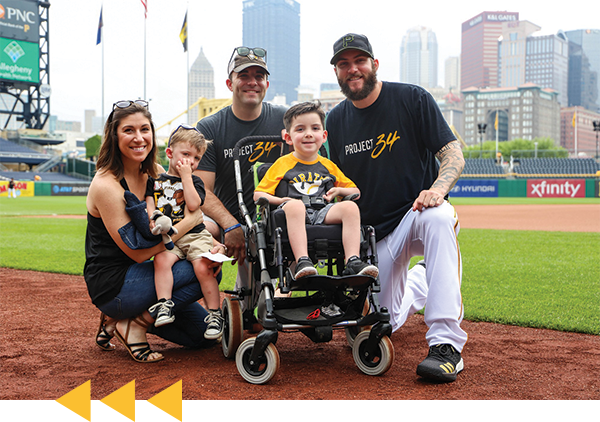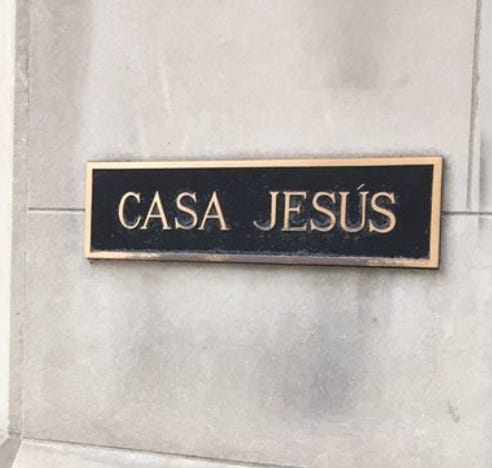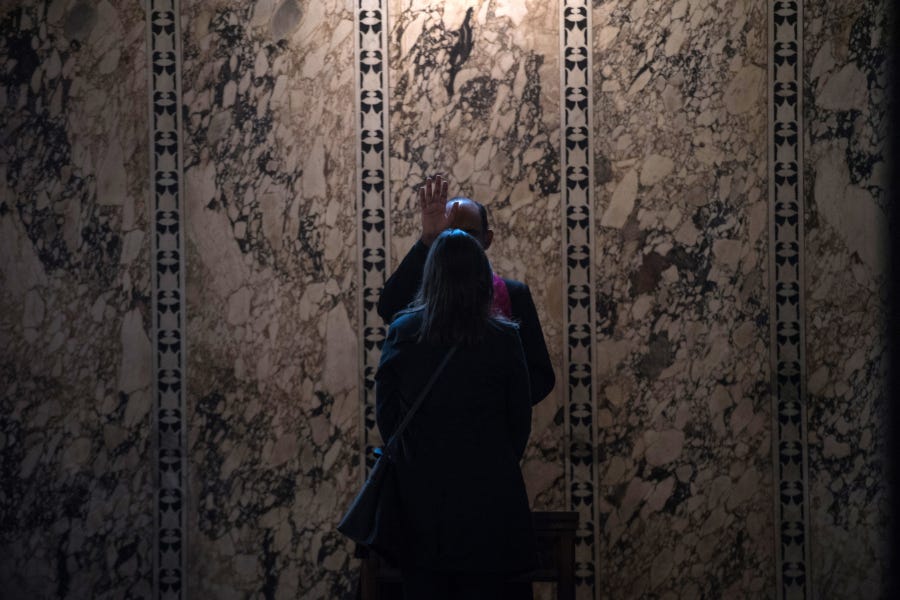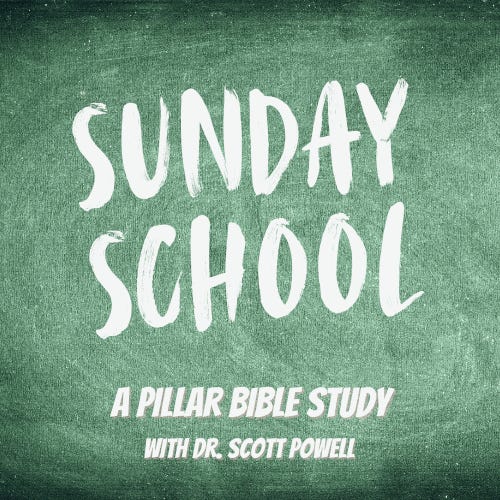Life in Major League Baseball can be a bit unpredictable. Players are drafted, farmed out, promoted, played, traded and sent around the country during one of the longest seasons in professional sports.
Along with all that comes the glare of the media spotlight, and having your every day at the office watched live by millions of people cheering you on or hoping you’ll choke. It can be hard to stay focused.
The trick, ballplayer Trevor Williams says, is not to let the game define you.

“I've always been told that the most important thing is you don't introduce yourself as a baseball player,” the big league pitcher told The Pillar this week. “You introduce yourself, saying ‘Look, I'm a husband, I'm a father, I'm a brother, I'm a friend. And then by the way, I also play baseball as well.’”
Williams does, indeed, play baseball. He made his big league debut with the Pirates in 2016. Since then he’s also pitched for the Cubs, and weeks ago found himself suiting up for New York, after being traded to the Mets on the July trade deadline day.
Keeping track of where you are — and who you are —can be a challenge in the middle of The Big Show.
You need to have have faith, Williams said, and you need to share it.
Two tickets to Mass
“The game is a huge part of my identity. There's no doubt about that. It has provided a lot of opportunities for me. I love the game of baseball. I love competing.”
“I also love Christ’s Church and I love being able to speak out about my faith in this setting,” Williams, 29, told The Pillar.
Looking out at the stands on a crowded gameday, he said, can make you question what really matters in life. There might not be an exact parallel between sports fandom and faith, Williams said, but the zeal of sports fans for their teams has challenged him to take his faith more seriously.
“A lot of people are fanatics for their sport, right? That's the term ‘fan,’” Williams told The Pillar.
Bleacher brawls are not what anyone wants to see in the pews on Sunday, he said, but the devotion of fans at the ballpark has made him wonder about how he’s showing his own devotion to the faith.
“In the end it's like, well, why aren't why aren't I dressing up every Sunday? Why aren't I telling everyone ‘Hey, I'm going to Mass today at 7:00 PM. I got tickets to Mass, who wants to go with me? I have an extra ticket.’”
Baseball, like a lot of sports, can bring with it a lot of chances for humility — or for humiliation.
The best pitchers, at least in the National League, still have to take their turn at bat, and even the best batter gets called out three times more than he gets on base.
For Williams, the difference between humiliation and humility lies in looking for God in every situation.
But embracing humility in the face of setbacks and tough crowds isn’t easy.
“It's easy to say, and it's easy to pray, but there's always that prayer in the back of your mind, like ‘Jesus, if it is your will, humble me today, but in today's game I would also love seven clean innings. I’d also love to win this game now — maybe I can be humble in other ways after the game and the interview.’ I don't want to be humiliated on the mound. But sometimes that's what we're called to have happen.”
“When it's happening in the moment, it's hard to find how it is sanctified, right? But when you talk to people around the league, even without a faith background, it's part of the game; part of the game is failure and it’s how you respond to that failure and how you take up the cross of failure that is going to make you a better player, and has gotten me to be a better person.”
Family, home and away
Personal growth, in the game and in the faith have gone hand in hand for Williams. He was raised a cradle Catholic, and a cradle ballplayer, in San Diego, California. And growing as a Catholic was part of growing up, right alongside developing as a player in the only sport he was ever very good at.
But it was in his late teens that the Catholic faith became his own.
“My parents took me to Mass every Sunday, I did CCD, the entire nine yards. And it wasn't until I was confirmed in high school and going through youth ministry that it really formed me as a better Catholic right as I was going into college.”
Williams went to Arizona State to play ball. While there he decided to major in history, to keep his Catholic development on track.
“I studied history in college knowing that I was going to become a baseball player. So I studied history to take a post-Reformation Europe class, to take an early Christianity class, to pick stuff that's going to help me be a better Christian and also be a better Catholic and to know the Church more,” he said.
Williams met his wife in youth ministry when he was still a raw prospect, he says.
They married in 2014, after he’d been drafted by the Miami Marlins. Preparing for a life together is a work of discernment for any couple, but it’s made harder when you don’t know what farm team you might be assigned to from one month to the next, he remembered.
Williams’ now-wife Jacqui went to Gonzaga University to become a nurse. When Williams was drafted, that meant they needed to have a conversation.
“We had to really sit down, talk about it, pray through it,” he said. “Like, ‘This is my dream. My dream is to make it to the big leagues. Your dream is to become a nurse. How can we do this? Because you can't get licensed to be a nurse in every state we live in.”
For a lot of ball players, making things work means the family home is in one place, and the player goes where the game takes him during the season. But that’s not what Trevor and Jacqui wanted.
“We'd never see each other; we were very adamant that we weren't going to do that.”
Williams says his wife, Jacqui, chose an act of humility that helped cement their future.
“That humility that she poured forth saying ‘I'm going to put my dream on hold for yours’ was incredible. And it helped me fall in love with her more for her saying that.”
In the end, they decided that they would go wherever he was assigned, they would go together, as a family, and they would make it work.
The trust of his wife was a game-changer, Williams said.
“I knew I was going to be a big leaguer. I knew it, and I believed it. But for her to believe it as well was incredible, because it was a shot in the dark. She put her career on hold for mine when we got married.”
Soon after they wed, the couple moved to Jacksonville, where Trevor was assigned to play ball with the Marlins AA team. They didn’t know how long they’d be there, or what was next for their family, but they found out they were expecting their first child two months later.
The next season, he was traded to Pittsburgh, and he got the call up to the majors in September 2016.
Today, Williams has played for three major league teams, and he and his wife have three kids with another on the way.
Keeping faith and family together is still a challenge in a sport played mostly on nights and weekends, and with more than 80 games on the road.
Playing for the Cubs this season gave Williams a bit of a respite from that challenge. The Cubs have a higher number of day games than other ball club, because of Wrigley Field’s location in a residential neighborhood.
The number of day games meant that Williams could be home more often with his kids.
“When I was playing for the Cubs, it was like a normal nine-five job, because we had so many day games, I would wake up with the kids, go to ‘work’ and then come back in time to put them to bed. It was amazing to have that rhythm.”
On the road again
On the road, Williams said, rhythm is important too. So is fraternity.
“You make it work on the road, honestly. I hate to say it, but, my routine is almost better on the road because I have the ability to just leave my hotel room and go to Mass. I don't have to be like, ‘Okay, are all the kids ready?’ or ‘Is it nap time,’ you know?”
“Naturally athletes are creatures of habit: I know when I'm healthy, if I’m a starting pitcher every five days, on the day after my start I'm doing this, and the next day I'm doing that, it's a rotating cycle.”
“The routines that you get as a baseball player are dependent on your health. If my arm hurts, I can't throw and do my throwing routine. But if you create a habit spiritually, it doesn't matter if you're hurt. The first thing you do when you wake up, you’re praying the Liturgy of the Hours — if that's part of your routine, that's what you're doing regardless of if your arm hurts or not. Are you making sure you're getting to Mass every Sunday?”
“You have to make a routine, regardless of your health. And the Liturgy of the Hours has helped me the last few years. Certain prayers you pray as a family, and just getting into that routine, because I am a creature of habit, has helped me tremendously.”
“On the road it's a little easier because of brotherhood. There's an incredible ministry called Catholic Athletes for Christ and, prior to the pandemic, and now that most stadiums are opening back up, they have Mass every Sunday or Saturday night at the field. So that ministry has really helped me. My family would be able to come out to Mass at the field and we'd be able to celebrate.”
“And just having the option for other players that aren't going every Sunday — you can just say ‘Hey, there's Mass down in section 114, do you want to come out today? If you have an extra hour, you have an extra 45 minutes come on.’ There's a lot of good guys at the big league level. There's a lot of guys that love Christ and there's a lot of guys that understand that there's much more important things than baseball and that has been helpful. I met a lot of really good friends in baseball that way.”
Charity means love
Friendship and fraternity in baseball go back for Williams to long before his major league days. As a freshman at Arizona State, his roommate and teammate was Cory Hahn, himself a top-ranked prospect out of California. But Hahn’s career came to an early and tragic end before it could begin — he broke his neck sliding into second, leaving him paralyzed.
Hahn and Williams remained close, as one fought through years of hard physiotherapy to recover limited use of his arms, and the other worked his way up to the big leagues.
They saw a need, Williams says, for special equipment, home renovations, customized transportation, but also for fellowship.
“Cory was lucky, in the sense that he got hurt on a baseball field and the NCAA covered his medical expenses and his rehab. And with him being in the spinal cord injury community, he recognized that there was a lack of, well, community.”
“We started this foundation to help people with spinal cord injuries, and we do anything that’s needed. We just finished a home improvement. We just did a truck upgrade where a guy needed a new chair lift for his truck. There is this kid who wants to become a Paralympic [wheelchair] basketball player, so we got him a basketball wheelchair.”
“We're in our third or fourth year, and we're loving it. We're seeing the fruits of our labor, finally. Cory and I, we look back and we try to find a greater good coming out of a tragedy.”
“We're not gonna try to point to something specific, like ‘you got hurt so we can help this person,’ but it's something that transcends, hopefully, our lives and continues helping people for a long time.We've met a lot of great people. We have seen a lot of good things done through our charity and we couldn't be more proud of it.”
Williams talks a lot about the people he’s met through Project 34, men and women and families who’ve had to endure real tragedy; a young man who was shot in the neck and paralyzed the night of his high school graduation, a family who had to cope when one morning their son woke up and simply couldn’t move. He also talks a lot about charity as love, and learning from the people he’s met, and the need to love your neighbor.
“Just seeing all these tragedies happen, but having no one lose their spirit or lose their faith is something that helps me love, helps me love more. It's incredible. We've been hit by the pandemic as well. One of our first grant recipients passed away from COVID. So to see that, to talk to the family, to see how grateful they were for how the foundation could help, and how they're giving it back to the next family is incredible. I'm just super thankful for everyone who has helped our projects, I'm super grateful for everyone who has reached out wanting to help. It's been an incredible few years.”
Faith in the future
The career of a major leaguer is uncertain, for a pitcher maybe more than anyone else. A problem with a fingernail can drop you out of the rotation, and no one ever really knows how long a pitching arm will last.
Williams says he hopes he can pitch until he’s 45, more than a decade from now. But he also says every season is a blessing. The real future that matters, he says, is well beyond the game.
“We're expecting our fourth in November and we are so incredibly blessed,” he told The Pillar. “As a husband, the one thing you want is to help your wife get to heaven, right? And then as a father, you want your children to get to heaven. And that's it, that's really it. Everything else is moot.”
“This year has been wild, starting the season not knowing what team I was going to play on, to playing for the Cubs, my dad's favorite team, to getting traded, going to New York, of all the teams.”
For the rest of the season anyway, Williams’ family is on the other side of the country.
They're back in San Diego and I'm stuck in New York,” he said. “But we’re really looking forward to whatever comes next. Hopes and dreams? Man, I just hope my kids all get to heaven, and I hope I can help them in any way.”




